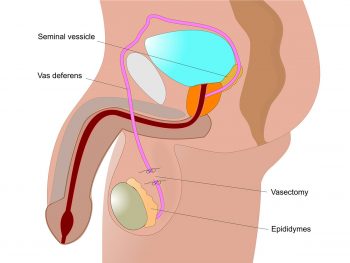By Marco Torres
Guest writer for Wake Up World
There are some things in life that shouldn’t be messed around with and the internal wiring of the human body is one of them. Most men who pursue vasectomies do so to freely engage in sexual intercourse without the consequence of procreation. Few are aware of the negative health effects. Large studies have confirmed the link between vasectomy and prostate cancer, tumors as well as chromosomal abnormalities in sperm.
As comedian Benny Ross has stated “the inventor of vasectomies must have been a prison warden… who else would prevent these rambunctious little swimmers from getting to their destination.”
Humour aside, vasectomies are no laughing matter.
Hundreds of millions of surgical vasectomies have been performed worldwide. Chemical sterilization appears to be an evolving practice by mainstream medicine through pharmaceutical intervention, however the risks and long-term health effects have not been studied.
[pro_ad_display_adzone id=”110028″]
Studies reported in The Journal of the American Medical Association, financed by the National Institutes of Health and conducted by a team headed by Dr. Edward Giovannucci from the Brigham and Women’s Hospital and Harvard University in Boston, suggest that men who had a vasectomy more than 20 years earlier faced up to an 89 percent greater risk of prostate cancer than men who had not had a vasectomy. The studies also found that the more time that had passed since a vasectomy, the greater was the risk of developing prostate cancer.
In 1990, a small study from Edinburgh, Scotland, found that an unexpectedly large number of men who had had vasectomies later developed testicular cancer. Experts said the findings show a statistical association that required further study. They speculated that such a biological mechanism might be related to the decreased amount of prostate fluid after a vasectomy or to suppression of immune reactions that affect cancer. The biological cause for the association is not yet evident.
Vasectomies have also been linked to tumors in animals. A report in the American Journal of Pathology says mice given vasectomies had a significantly higher incidence of spontaneous tumors than unaltered rodents. The results didn’t show up until the mice in the study reached old age. Then they developed more tumors and multiple tumors.
Dr. D. J. Anderson of the Oregon Regional Primare Research Center et al found that sperm is still produced after a vasectomy and retained in the testicles. Pressure caused by the accumulating sperm cells can cause them to leak in the rest of a patient’s body, where they are identified as “foreign” and attacked by the immune system.
It is possible, the researchers say, that products created or left over when sperm are attacked by the immune system may help initiate tumors. Or, they say, the normal surveillance system of the immune system may be disrupted through a similar mechanism.
The World Health Organization has stated that he studies headed by Dr. Edward Giovannucci were “of high scientific quality” and that the scientific design of the studies avoided many of the methodological problems of earlier studies, some of which did not find a link between vasectomy and prostate cancer.
Experts in the United States and at the W.H.O. said that additional studies were urgently needed because confirmation of the latest findings would have a critical effect on family planning programs. Crucial information could come from at least six ongoing studies in the United States and Europe, the W.H.O. said.
Indications of a link between vasectomy and prostate cancer from recent studies led the World Health Organization to convene a committee of 23 experts from 10 countries.
W.H.O. officials said that they did not know why reports from the meeting had not been published, as it had been announced they would be, in The European Journal of Cancer.
At an annual meeting of the British Fertility Society, researchers suggested that even if the surgical effect of a vasectomy can be undone, the long-term effects on sperm production may not be so reversible.
Vasectomy has also been linked to dementia. In one study almost a third of the men who had dementia had also had a vasectomy. A rare form of dementia called primary progressive aphasia has also been linked to vasectomy procedures.
Vasectomies work by deliberately obstructing the tube that carries sperm from the testis, thereby preventing sperm, which continues to be produced, from being ejaculated. Researchers from the School of Medicine, Obstetrics and Gynaecology at Queen’s University, Belfast, studied men who had vasectomies and found that years after the operation, they found the men had a much lower sperm production rate compared to those (fertile) men who hadn’t ever had the operation.
Researchers from Thailand found that rate of abnormalities dropped but only after an undetermined time after a reversal operation. Team leader Professor Nares Sukchareon said that the study raised important questions, such as ‘is the abnormal spermatogenesis [sperm production] reversible, and if so, how long will it take to get back to normal?’
So we have to ask ourselves gentlemen: Is relieving our conscience so that we may freely engage in sexual intercourse without the risk of procreating worth it? Your elder self may have a different opinion.
Sources:
Recommended articles by Marco Torres:
- Study: The Most Harmful Addictive Drugs Worldwide are Alcohol and Tobacco
- The Endocannabinoid System and How THC Cures Cancer
- Cannabis Significantly Reduces Depression, Anxiety, and Stress
- Study Shows The Therapeutic Effects of Marijuana on Autistic Children
- 5 Diseases Proven To Respond Better To Cannabis Than Prescription Drugs
- Another Reason Marijuana is Illegal: It Prevents the Spread of HIV
About the author:
Marco Torres is a research specialist, writer and consumer advocate for healthy lifestyles. He holds degrees in Public Health and Environmental Science, and is a professional speaker on topics such as disease prevention, environmental toxins and health policy.
This article courtesy of Prevent Disease.
[pro_ad_display_adzone id=”110027″]








